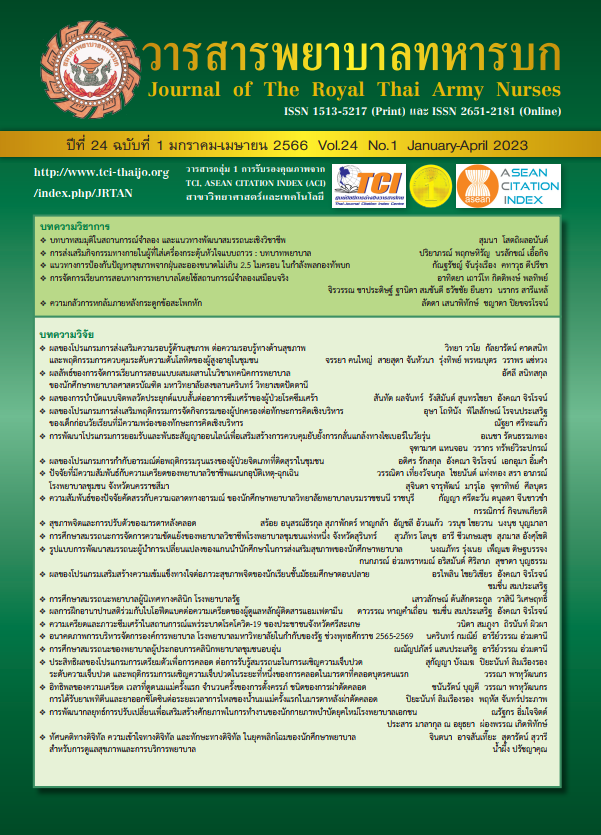A Model of Transformational Leadership Competency Development of Student Peer Leader for Enhancing Health Promotion among Nursing Students
Keywords:
model, student peer leader, transformational leadership competency, health promotion, nursing studentAbstract
This research and development aimed to (1) study attitude and health promotion behavior among nursing students, (2) develop a model of student peer leader development for enhancing health promoting behaviors among nursing students, and (3) evaluate the effectiveness of developed model. Instruments consisted of open-ended questions, attitude of health promotion questionnaire, health promotion behavior questionnaire, and transformative leadership competency questionnaire. Reliability was reported as Cronbach’s alpha 0.86, 0.81, 0.89 consequently. The two-phase study consisted of qualitative and quantitative approaches. In Phase I, in-depth interviews and questionnaire administration were carried out to obtain information. Seventeen lecturers were interviewed. In addition, questionnaires were administered to 308 nursing students. Student peer leader development process for enhancing health promoting behaviors among nursing students consisted of 3 stages as follows: (1) developing transformational Leadership competencies of student leaders, (2) planning for health promotion projects, and (3) implementing and evaluating health promotion projects. Phase II, consisted of administration and evaluation of the developed model, via use of a pre-test /post-test one group design, with 50 student peer leaders and 150 nursing students. Data was analyzed by descriptive statistics (frequency, percentage, mean, standard deviation), paired t-test and content analysis. The developed model was found to enhance the nursing students’ transformational leadership competencies, attitude, health promoting behaviors and decrease body mass index of overweight nursing students with statistically significant differences at .01 level (p <.001).
Downloads
References
Stacciarini JMR, McDaniel AM. EMBRACE: Developing an inclusive leadership program with and for undergraduate nursing students. Journal of Professional Nursing 2019;35(1): 26-31.
Anderson M. Transformational leadership in education: A review of existing literature. International Social Science Review 2017; 93(1):1-15.
Hanawi SA, Saat NZM, Zulkafly M, Hazlenah H, Taibukahn NH, Yoganathan D, ...Low FJ. Impact of a healthy lifestyle on the psychological well-being of university students. International Journal of Pharmaceutical Research & Allied Sciences 2020;9(2):1-7.
Holt M, Monk R, Powell S, Dooris M. Student perceptions of a healthy university. Public Health 2015;129(6):674-83.
Dooris M, Wills J, Newton J. Theorizing healthy settings: a critical discussion with reference to Healthy Universities. Scandinavian Journal of Public Health 2014;42(15_suppl):7-16.
Çalışkan C, Arberk K, Üner S. Healthy lifestyle behaviors of university students. Prehospital and Disaster Medicine 2017;32(S1):S213.
Plotnikoff RC, Costigan SA, Williams RL, Hutchesson MJ, Kennedy SG, Robards SL,... Germov J. Effectiveness of interventions targeting physical activity, nutrition and healthy weight for university and college students: a systematic review and meta-analysis. International Journal of Behavioral Nutrition and Physical Activity 2015;12(1):1-10.
Nassar OS, Shaheen AM. Health-promoting behaviours of university nursing students in Jordan. Health 2014;6(19):2756-63.
Polat Ü, Özen Ş, Kahraman BB, Bostanoğlu H. Factors affecting health-promoting behaviors in nursing students at a university in Turkey. Journal of Transcultural Nursing 2016;27(4): 413-9.
Astin AW. Assessment for excellence: The philosophy and practice of assessment and evaluation in higher education. Maryland: Rowman & Littlefield Publishers;2012.
Bass BM, Riggio RE. Transformational leadership. New Jersey: Lawrence Erlbaum Associates Publishers;2006.
Pender NJ, Murdaugh CL, Parsons MA. Health promotion in nursing (7th ed.). New Jersey: Pearson;2015.
Faul F, Erdfelder E, Lang AG, Buchner A. G* Power 3: A flexible statistical power analysis program for the social, behavioral, and biomedical sciences. Behavior research methods 2007;39(2):175-91.
Cohen J. A power primer: quantitative methods in psychology. Psychology Bull 1992;112(1): 155-9.
Best JW, Kahn JV. Research in Education.10thed. Boston:Pearson;2006.
Hair FJ, Black CW, Babin JB, Anderson ER. Multivariate Data Analysis. 7thed. New Jersey:Pearson;2010.
Pumsangua K, Prasittivatechakool A. Patterns in developing nursing students of The Royal Thai Army Nursing College to be health promotion leaders in relevance to exercise, food consumption and stress management. Journal of The Royal Thai Army Nurses 2014; 15(1):73-80. (in Thai)
SuangKaew S, Kooariyakul A. Competency development model of nurse students toward a health promotion practitioner. Journal of Nursing and Education 2017;7(2):32-46. (in Thai)
Downloads
Published
How to Cite
Issue
Section
License
Copyright (c) 2023 Journal of The Royal Thai Army Nurses

This work is licensed under a Creative Commons Attribution-NonCommercial-NoDerivatives 4.0 International License.
บทความหรือข้อคิดเห็นใดใดที่ปรากฏในวารสารพยาบาลทหารบกเป็นวรรณกรรมของผู้เขียน ซึ่งบรรณาธิการหรือสมาคมพยาบาลทหารบก ไม่จำเป็นต้องเห็นด้วย
บทความที่ได้รับการตีพิมพ์เป็นลิขสิทธิ์ของวารสารพยาบาลทหารบก
The ideas and opinions expressed in the Journal of The Royal Thai Army Nurses are those of the authors and not necessarily those
of the editor or Royal Thai Army Nurses Association.






